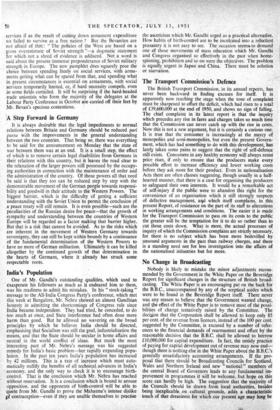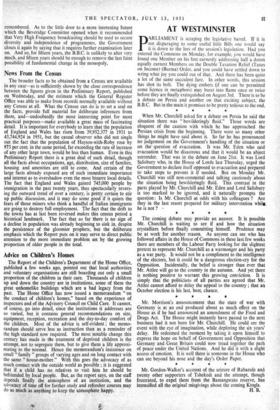No Change in Broadcasting
Nobody is likely to mistake the minor adjustments recom- mended by the Government in the White. Paper on the Beveridge Report for significant changes in the structure of British broad- casting. The White Paper is an encouraging pat on the back for the B.B.C., unaccompanied by any of the sceptical asides which were to be found in the Beveridge Report itself. There never was any reason to believe that the Government wanted change, and the effect of the White Paper is• to remove most of the possi- bilities of change tentatively raised by the Committee. The decision that the Corporation shall be allowed to keep only 85 per cent. of the revenue from licences, instead of the 100 per cent. suggested by the Committee, is excused by a number of refer- ences to the financial demands of rearmament and offset by the reasonable decision that the B.B.C. shall be allowed to borrow £10,000,000 for capital expenditure. In fact, the untidy practice of paying for capital development out of revenue may now end— though there is nothing else in the White Paper about the B.B.C.'s generally unsatisfactory accounting arrangements. If the pro- posal that there should be Broadcasting Councils for Scotland, Wales and Northern Ireland and new "national" members of the central Board of Governors leads to any fundamental im- provement in programmes it will be welcome, but hope on this score can hardly be high. The suggestion that the majority of the Councils should be drawn from local authorities, besides being ine.xplicatile on cultural grounds, adds a characteristic touch' of that dreariness for which our present age may long be remembered. As to the little door to a more interesting future which the Beveridge Committee opened when it recommended that Very High Frequency broadcasting should be used to secure diversity and independence of programmes, the Government closes it again by saying that it requires further examination later on. And so, for fifteen years, the B.B.C. is unlikely to alter very much, and fifteen years should be enough to remove the last faint possibility of fundamental change in the monopoly.







































 Previous page
Previous page